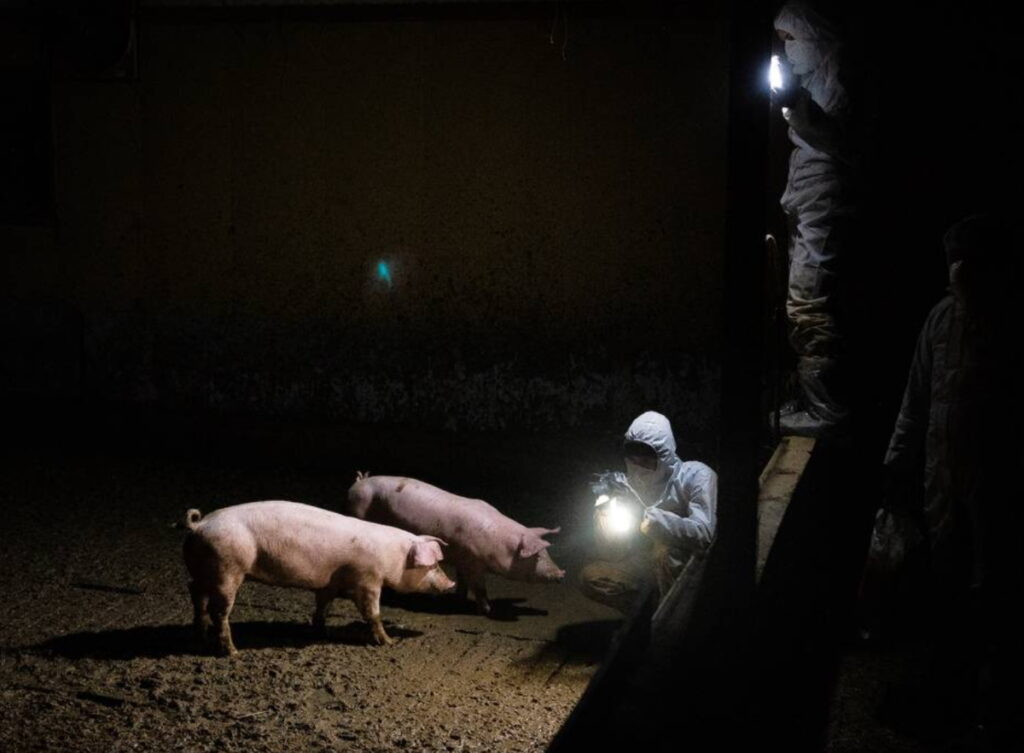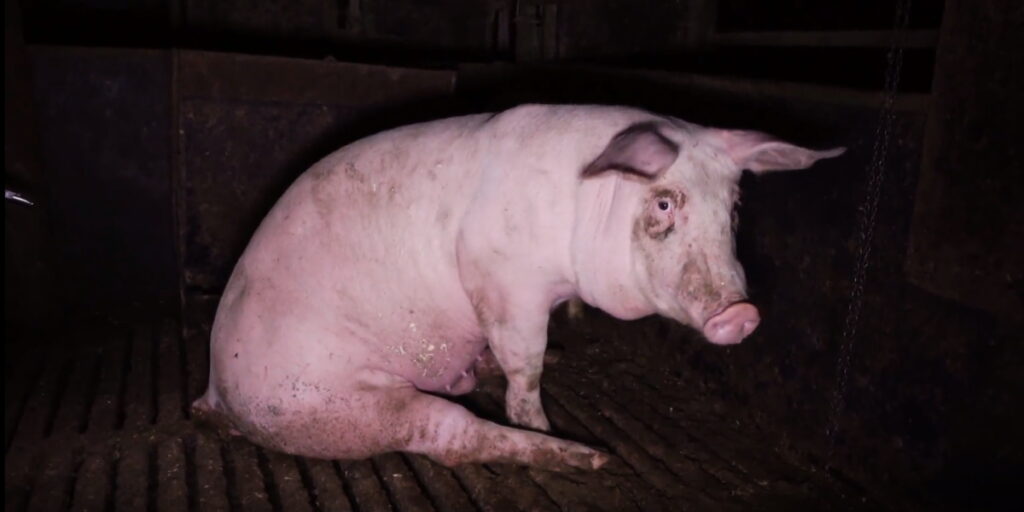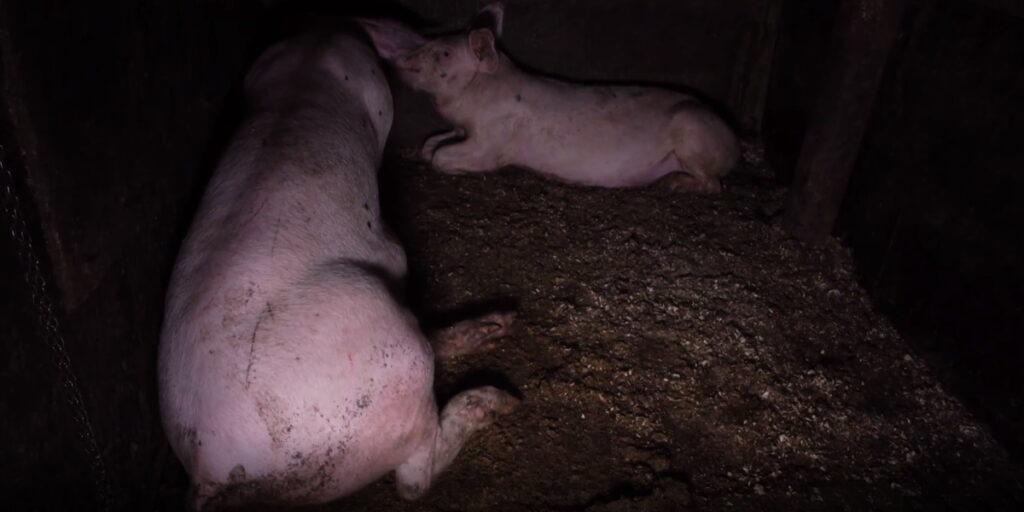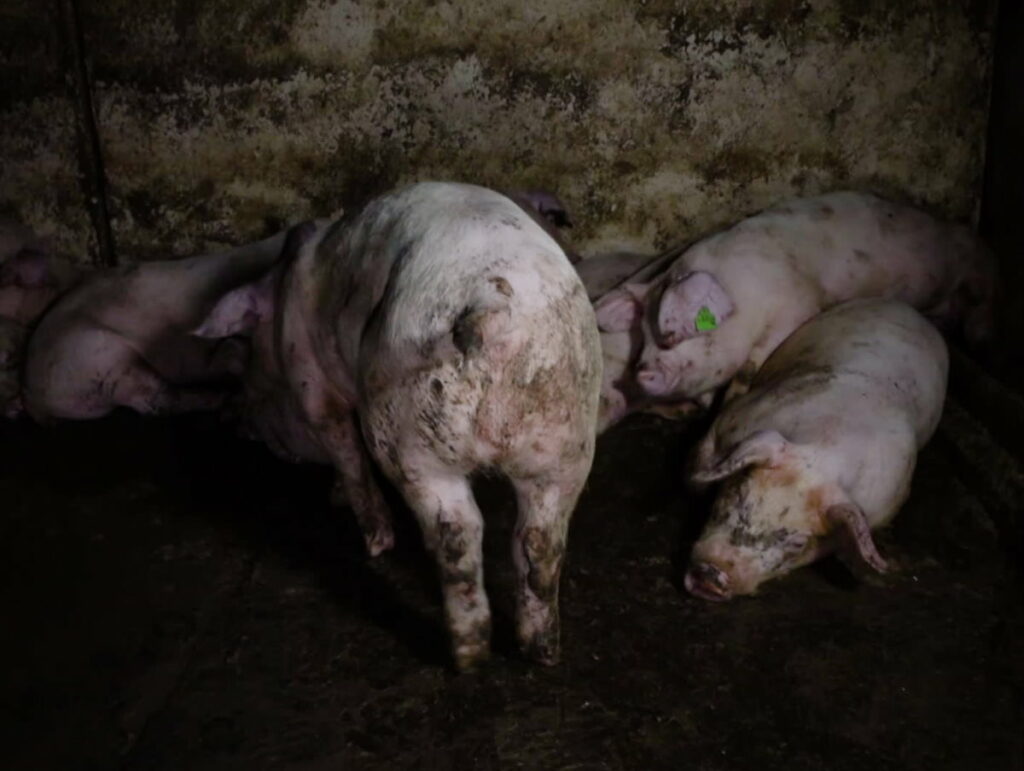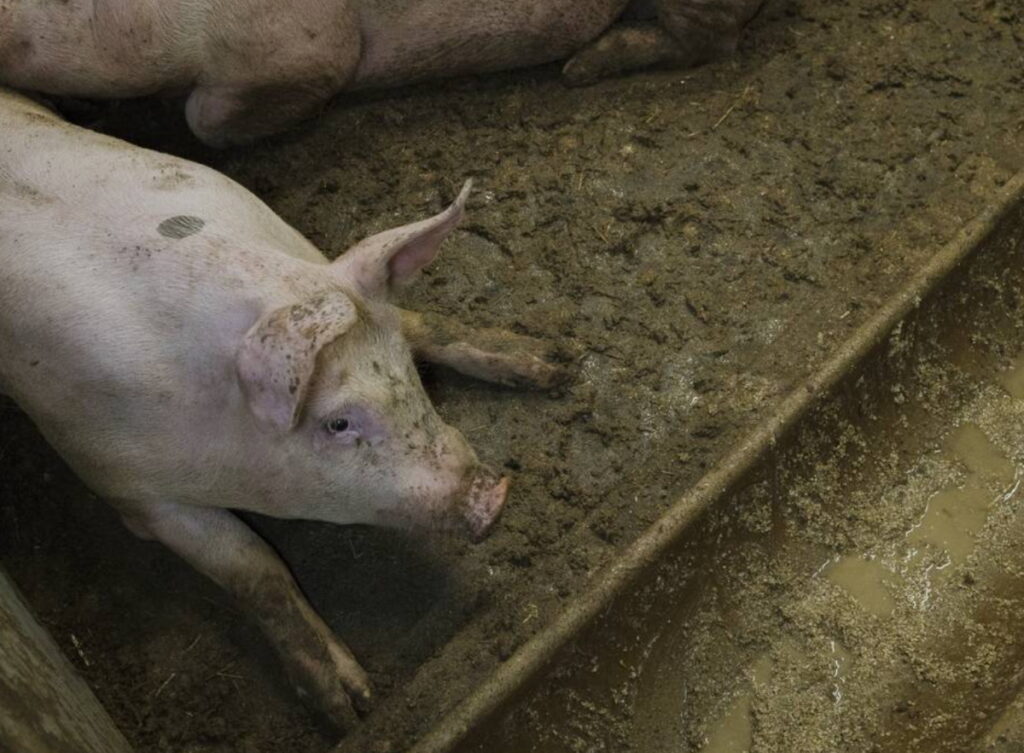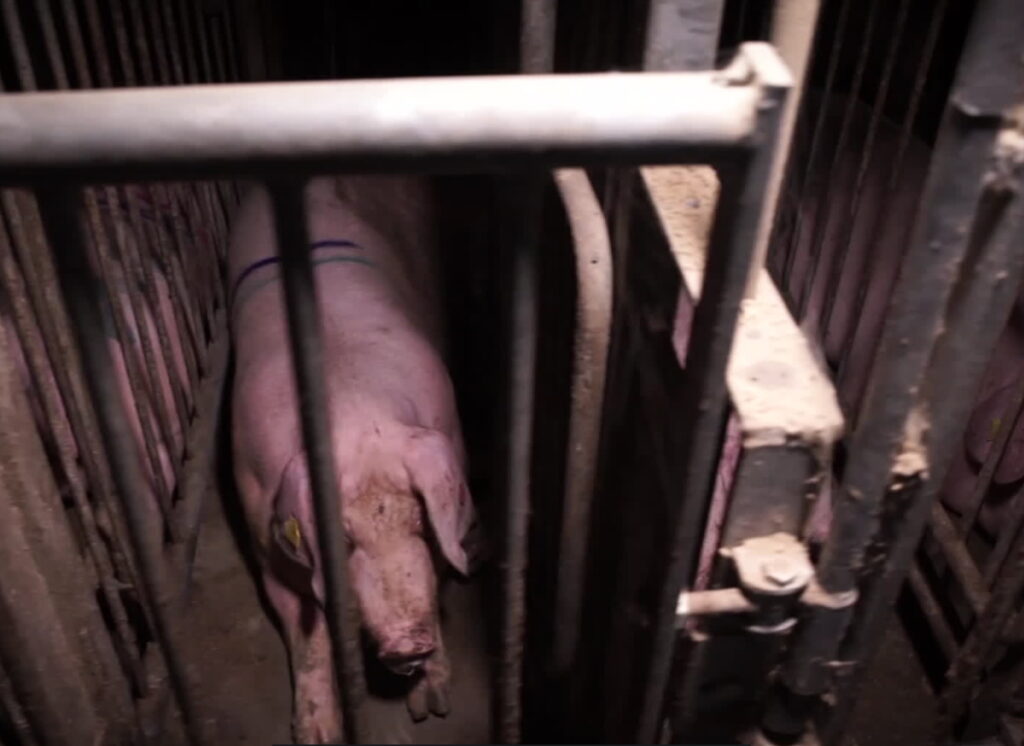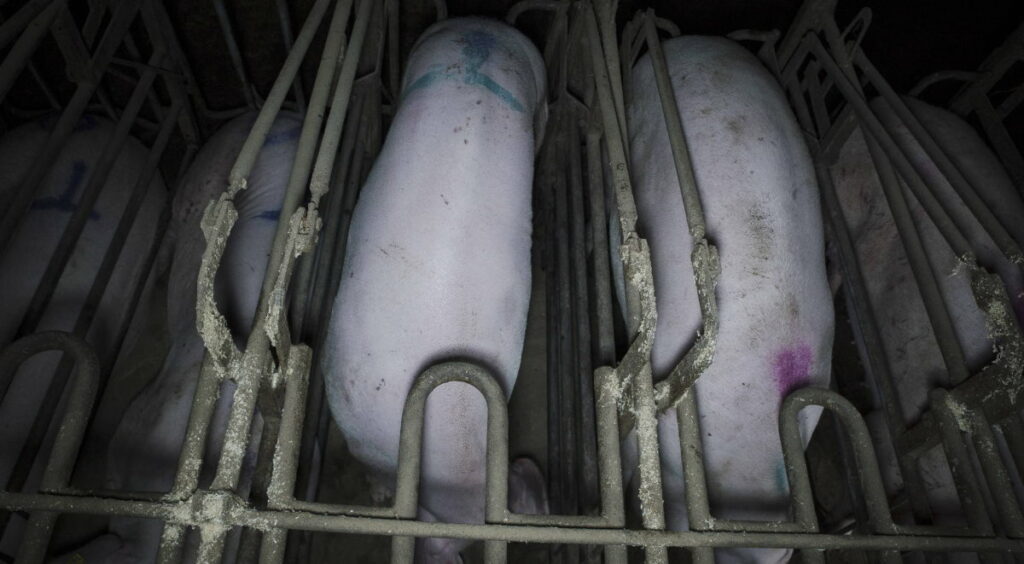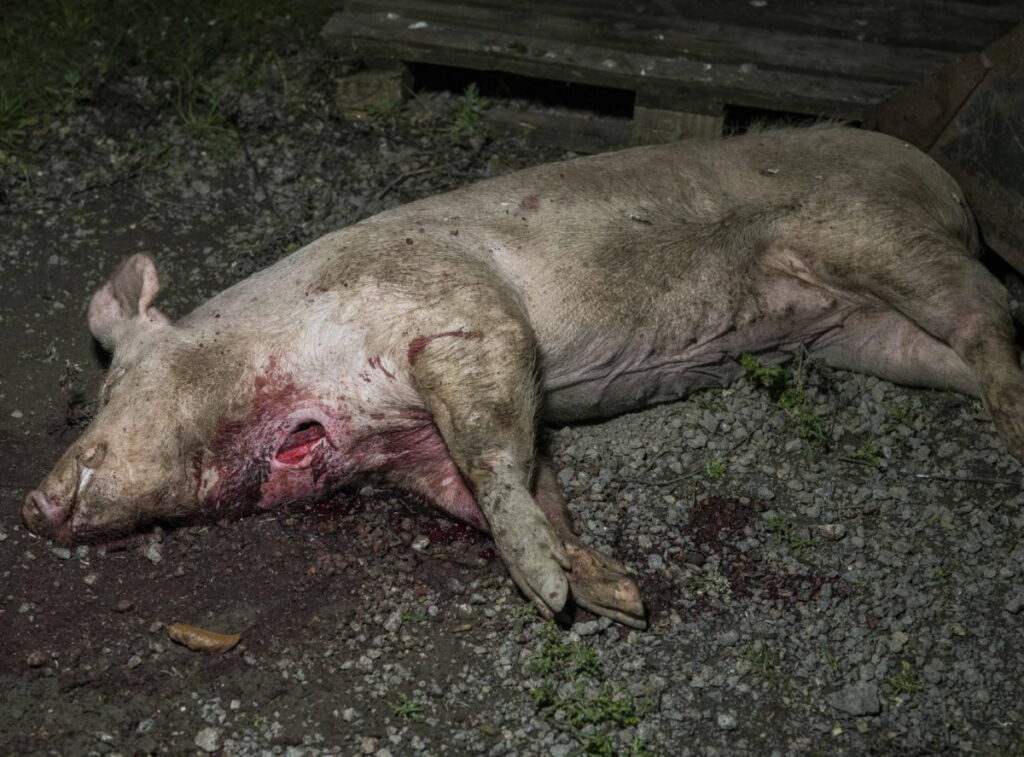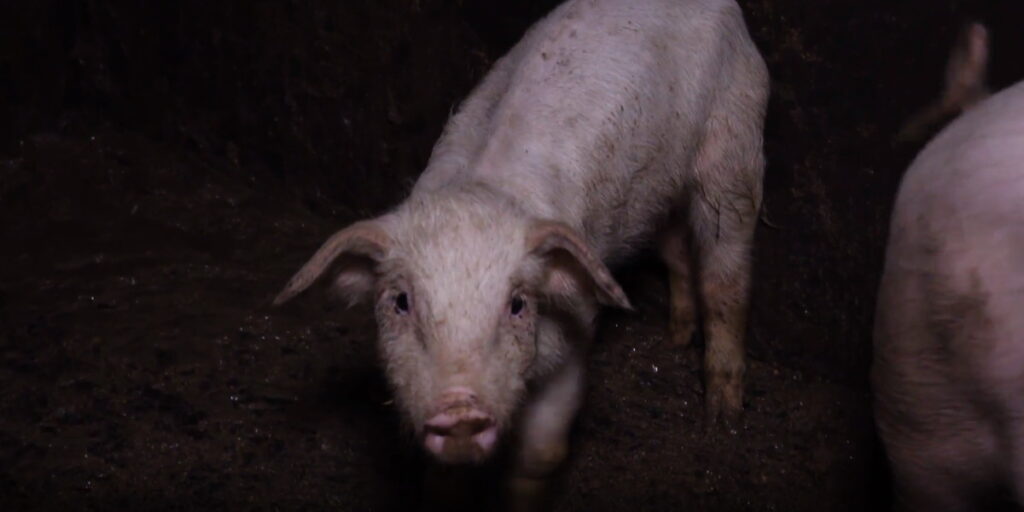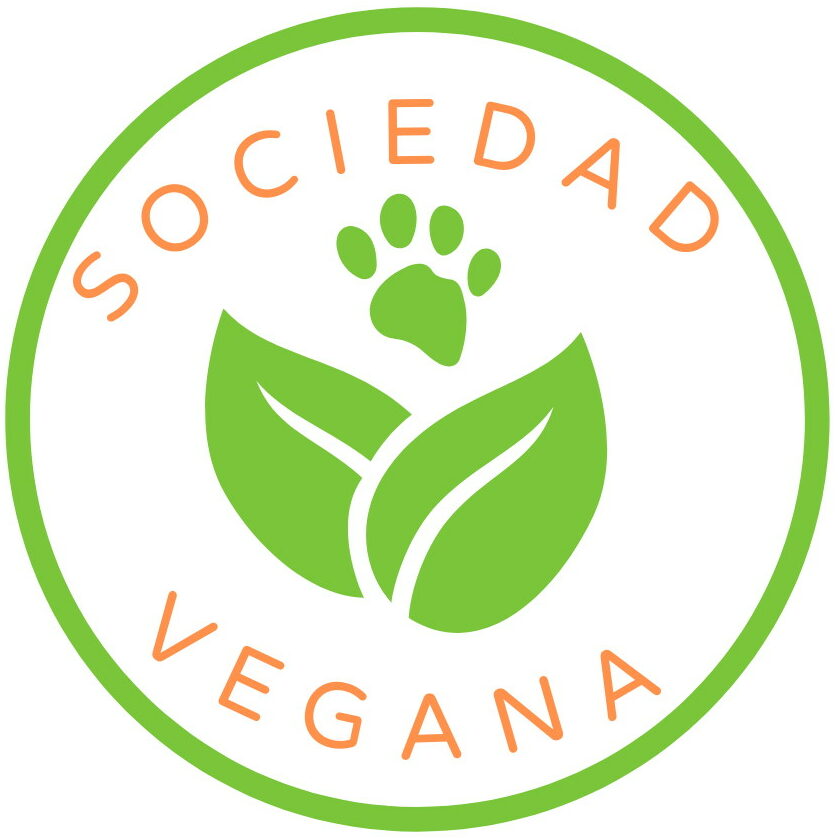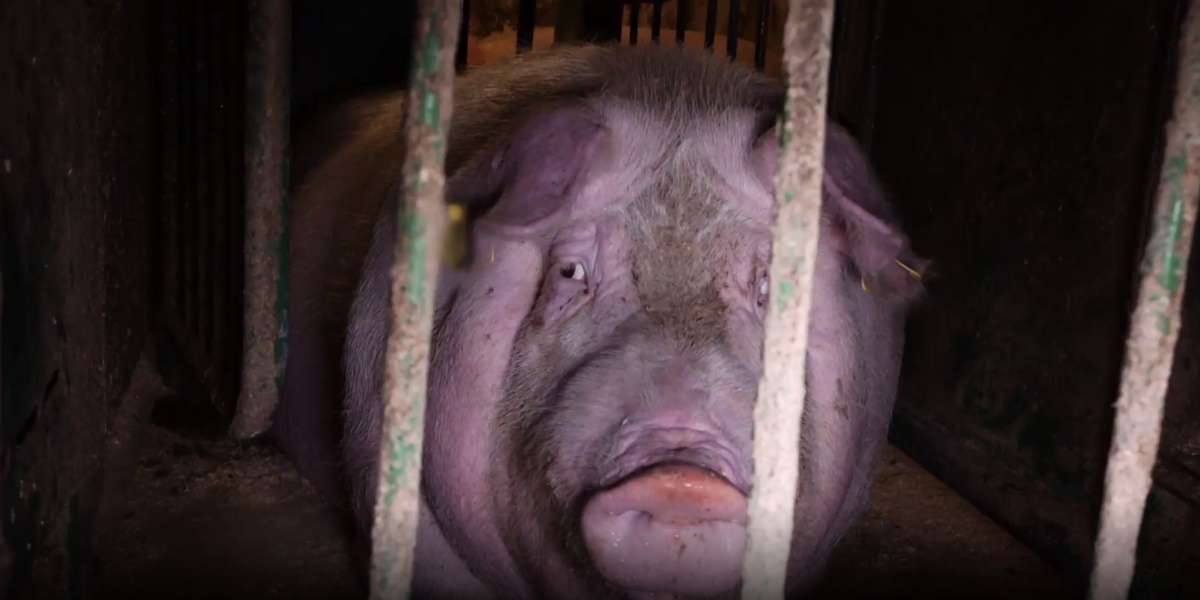In Norway, pig farmers, the union that represents them, the administrative authority that controls them, and the political authority that governs them have, in practice, colluded against the welfare of the animals. Thus, a systematic combination of violence and neglect, administrative incompetence and political indifference only increases the helplessness and suffering of farmed pigs.
09/06/2021 After a major scandal in 2019, in which the Norwegian Broadcasting Corporation, NRK, revealed serious animal welfare violations by pig producers, industry representatives promised a “thorough review” of their control procedures that would “result in a new era where animal welfare would be guaranteed“. The government also weighed in, expressing annoyance and disappointment at the offenders.
The documentary, entitled “Secrets of the pig industry“, was based on footage shot over several years by a woman who worked on different Norwegian pig farms. The footage shows shocking images of systematic cruelty to animals and serious violations of the Animal Welfare Act, such as pigs being beaten with feet and fists or with sticks, small pigs being killed with hammers, illegal castrations and widespread welfare problems, such as pigs living in fetid and wet environments, in their own faeces and urine, many with open wounds and abscesses.
The documentary revealed appalling attitudes among pig farmers. “These attitudes do not arise on their own. The intensive pig production system treats the pig as a machine for cheap meat, and not as a sentient individual,” NRK commented, adding that legislation is too weak in the Norwegian pig production industry. In this regard, NRK noted in 2019 that the lack of enforcement was common to all pig farms covered in its documentary. “Moreover, the regulations for the pig industry are so bad that pigs even suffer on farms that do not break the law.” As an example of such practices, the documentary mentioned that almost all Norwegian pigs are kept confined in small concrete enclosures for their entire lives, without the opportunity to satisfy their innate needs. “The state of pig production speaks both of a failure of the system and of serious mentality problems,” NRK revealed.
The June 2019 events ended when Agriculture Minister Olaug Bollestad declared – after wrapping up the last of three meetings with representatives of the pig industry – to be “impressed by the good remediation work that has been done“. NRK writes: “Then the debate faded and the barbecue season continued relentlessly. That summer, the sale of pork increased by 15%“. A year later, the Norwegian Farmers’ Association (Norges Bondelag) concluded that the welfare of Norwegian pigs was good.
However, once the media storm of 2019 had passed, things went back to normal, i.e. systematic abuse and cruelty against generation after generation of pigs.
On Saturday 5 June 2021, NRK published a report on its website together with a TV documentary, a podcast and several interviews, covering an investigation by the Norwegian animal rights organisation Network for Animal Freedom (Nettverk for dyrs frihet), which sought to confirm or debunk whether the pig farms had delivered what they had promised in 2019. The headline of the report already anticipates the conclusions: “The broken promises of the pig farmers.”
The report begins by recalling a meeting held in 2019 by the Minister of Agriculture, Olaug Bollestad, who said she was “annoyed and disappointed” at the hidden camera revelations showing extreme violence, and thus criminal acts, perpetrated against pigs on Norwegian farms. The Minister demanded an immediate action plan from the industry to remedy the situation.
The response from those NRK calls “the meat bosses” was to “promise, promise and promise“. The promises would, according to these bosses, lead to “being good to be a pig“, a goal to be achieved with the installation of surveillance cameras in slaughterhouses, training for farmers and a compulsory animal welfare programme.
Now, two years later, Nettverk for dyrs frihet presented NRK with a substantial dossier of photographs and videos showing frustrated, sick and injured animals, some of them dying or even dead.
The documentary demonstrates, once again, the systematic and blatant abuse of Norwegian pigs. Members of Nettverk for dyrs frihet visited a selection of farms overnight, observing and documenting the horrendous conditions in which they live while waiting to die.
The photos and videos include heartbreaking images of undignified conditions. Cramped, filthy, dark and wet cubicles, with sad and sick animals.
It is also clear that Norwegian producers keep pregnant sows in illegal cages. This means that the sows are confined in a tiny area, with a metal frame around the body, which prevents them from moving. The sows are kept like this while they give birth and in the period afterwards. The piglets suckle through the bars.
The documentary reveals that Norwegian pork producers have repeatedly shown that they are unable to provide the pigs with acceptable welfare, even after warnings from the political and administrative authorities, and from their own customers – the meat brands.
According to NRK, the Norwegian Food Safety Authority (Mattilsynet) has also detected the substandard welfare of pigs in Norway on its own, but without doing much about it. The fact that Mattilsynet has discovered bad practices is, in itself, somewhat surprising, given that it usually announces its inspections to the producers. In other words, producers have plenty of time to make the necessary cosmetic changes before the inspections.
In 2017-2018, Mattilsynet carried out an inspection campaign in the Rogaland region in the southwest of the country, where 30% of all Norwegian pigs are reared. The conclusion was “disappointing findings” and that “pigs on farms in Rogaland do not have good enough animal welfare“.
The board chairman of Nortura, which owns the Gilde and Edelgris pork brands, told NRK that they continue to work on animal welfare, although he did not mention any specific measures. Another brand, Fatland, strongly denies allegations of animal cruelty.
NRK contacted the farmers themselves in order to gather their opinion, offering them full anonymity. All of them refused to be interviewed.
At the same time, a group of farmers reported the activists of Nettverk for dyrs frihet to the police, demanding an investigation for “surreptitious and illegal entry into their production facilities“. Some of the producers say they feel intimidated knowing that strangers entered their stables in the middle of the night. Some report experiencing anxiety problems.
Other producers have even denounced “the serious biological hazard that occurs when intruders enter a pig production facility“. In anticipation of this line of argument, the activists documented, with copious graphic material, their use of overalls and bio-protective footwear, as well as masks and gloves, during their visits. Even their photographic equipment, except for the lenses, were covered with cling film. They also carried out a complete preventive disinfection protocol before and after entering the farms.
NRK interviewed Bo Algers, professor of animal hygiene and one of Europe’s leading experts on pig welfare, who after analysing the images said he detected violations of the Norwegian animal welfare law on 26 of the 28 farms visited by the activists. “I am disappointed to see this. Under no circumstances should pigs walk in their own faeces. And we are forcing them to do just that. I see sadness in their eyes, which is a sadness that I feel myself“.
Cecilie Marie Mejdell, senior scientist and animal welfare expert at the Norwegian Veterinary Institute, said: “In these pictures it is dark, and you have to keep in mind that we cannot always see the whole area of the enclosure. Having said that, these pens, so dirty and humid, are unacceptable for animal welfare“.
Regarding the observation about the small areas in the photographs, and the possibility that they show a space selected by the activists precisely because they are negative images, it should be noted that NRK mentions in its report that it had access to photographs of entire areas of the production facilities, but that it chose to crop them in order to protect the identity of the farmers.
NRK showed the photographs to Trine Hasvang Vaang of Nortura, the company that owns the Gilde meat brand, and asked her for her opinion. “I think it’s terrible,” Hasvang Vaang said. NRK insisted: “Is it terrible for the producer, is it terrible for the pigs, or is it terrible for the sale of meat?” The executive said, “I am a farmer myself. I live with animals, and I make my living from them. Seeing images like this makes a big impression on me.” Asked about the promises made by her company in 2019, which included printing the text “If the product carries the Gilde brand, you can be sure that the animals had a good life” on its pork packages, Hasvang Vaang replied: “What we promised was that we would take action, if and when we found poor animal welfare. Our promise is still valid.”
Hasvang Vaang assured that her company continues to work towards its animal welfare goals, specifying that “our goal is that all producers who deliver pork to us comply with animal welfare standards. However, we cannot be 24/7 on their farms to monitor that they are doing their job properly“.
NRK sought comment from another of the companies mentioned, Fatland. The company was emphatic in rejecting the audio-visual evidence.
Nettverk for dyrs frihet activists provided NRK with two hours of video and 1600 photographs documenting serious animal abuse at a farm in Rogaland, which to this day delivers pork to Fatland. In response, Fatland sent NRK a 14-second video showing a group of pigs in a pen that, while small, is at least covered with hay on the floor. This 14-second sequence seeks to imply that the reality is different from the one reported, although without disproving the authenticity of the activists’ graphic material. The company refused to grant an interview to NRK.
On 5 June, NRK interviewed Minister of Agriculture Olaug Bollestad, who after seeing some of the graphic material said: “I am really irritated“, and then pointed out that it is the responsibility of producers to comply with the law and look after the welfare of their animals. As mentioned above, in 2019 the minister said she was “annoyed and disappointed“. Two years later, she feels “really irritated“.
NRK asked Tor Grobstok of Nettverk for dyrs frihet why they had broken the law by illegally entering pig farms at night. “Because it is the only possible way to get an honest, undisguised picture of pig production in Norway. In our view, consumers, and society as a whole, have a right to know how this food is produced,” he replied.
Finally, NRK interviewed Ingunn Midttun Godal, director of Mattilsynet, who pointed out that the footage showed “numerous violations of animal welfare law“. NRK asked her: “Shouldn’t Mattilsynet take more effective measures to stop the mistreatment?” Midttun replied: “Probably, but we are faced with a dilemma; on the one hand, to contribute to the farmer taking care of his animals, and on the other hand, if we take the most rigorous measures, we would take away the livelihood of that farmer“.
Once again then, the pig industry, trade organisations and the Norwegian administrative and political authorities are involved in a scenario that not only seriously undermines animal welfare, but also defrauds consumers.
Hector Pizarro
Sociedad Vegana
info@sociedadvegana.com
All photos (c) Nettverk for dyrs frihet via NRK (video stills and report captures)
Spanish version of this article
Suggested reading:
Updated report (15/08/2021) Norway’s farm animals are definitely left to their fate
Elbeik, Spain and the European Union: when rock bottom is reached
